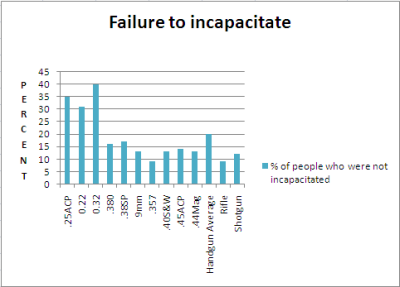Quote:
|
Originally Posted by Snort
I've always found this interesting:
http://www.buckeyefirearms.org/node/7866
Guy just analyzed every shooting case he could find, and compiled the data. Helped me let go of the notion that I "needed" to carry a .45.... |
That's an interesting study, but you might want to re-think putting aside your .45.
The following data from
that study is in my view the most interesting:

The assailants not incapacitated are the ones who can still hurt you.
And as Ellifritz says (emphasis added):
Quote:
|
Originally Posted by Greg Ellifritz
...Take a look at two numbers: the percentage of people who did not stop (no matter how many rounds were fired into them) and the one-shot-stop percentage. The lower caliber rounds (.22, .25, .32) had a failure rate that was roughly double that of the higher caliber rounds. The one-shot-stop percentage (where I considered all hits, anywhere on the body) trended generally higher as the round gets more powerful. This tells us a couple of things...
In a certain (fairly high) percentage of shootings, people stop their aggressive actions after being hit with one round regardless of caliber or shot placement. These people are likely NOT physically incapacitated by the bullet. They just don't want to be shot anymore and give up! Call it a psychological stop if you will. Any bullet or caliber combination will likely yield similar results in those cases. And fortunately for us, there are a lot of these "psychological stops" occurring. The problem we have is when we don't get a psychological stop. If our attacker fights through the pain and continues to victimize us, we might want a round that causes the most damage possible. In essence, we are relying on a "physical stop" rather than a "psychological" one. In order to physically force someone to stop their violent actions we need to either hit him in the Central Nervous System (brain or upper spine) or cause enough bleeding that he becomes unconscious. The more powerful rounds look to be better at doing this....
|
We know that many, perhaps even most, aggressors stop when shot because they choose to. They effectively give up. The real question is what will force the person physiologically to stop if he doesn't give up. And that will usually be one of the more potent cartridges.